Dr. Shrike Zhang
 Dr. Shrike Zhang
Dr. Shrike ZhangAssistant Professor of Medicine, Brigham and Women’s Hospital
Harvard University
Dr. Zhang is currently an Assistant Professor at Harvard Medical School and Associate Bioengineer at the Brigham and Women’s Hospital. Dr. Zhang’s research is focused on innovating medical engineering technologies, including 3D bioprinting, organs-on-chips, microfluidics, biomedical imaging, and biosensing, to recreate functional tissues and their biomimetic models. In collaboration with a multidisciplinary team encompassing biomedical, mechanical, electrical, and computer engineers as well as biologists and clinicians, his laboratory seeks to ultimately translate these cutting-edge technologies into the clinics. He is an author of >150 peer-reviewed publications and his scientific contributions have been recognized by >40 international, national, and regional awards. More information can be found on his website (www.shrikezhang.com).
Dr. Riccardo Levato
 Dr. Riccardo Levato
Dr. Riccardo LevatoAssistant Professor
Regenerative Medicine Center Utrecht and Dept. of Orthopaedics
University Medical Center Utrecht
Dr. Riccardo Levato is Assistant Professor of Biofabrication and Regenerative Medicine at the Department of Orthopedics, University Medical Center Utrecht (UMCU) and at the Regenerative Medicine Center Utrecht. His research focuses on the development of novel biofabrication strategies to create bioprinted, lab-made tissue models and transplantable engineered grafts, particularly for the regeneration of the musculoskeletal system. At UMCU, his lab integrates expertise in engineering, stem cell biology, and cartilage and bone pathophysiology, to translate biofabricated structures towards novel treatments for the regeneration of damaged articulating joints. For his work on biofabrication, he was conferred several awards, including the 2018 Orthoregeneration Network Fellowship by the International Cartilage Repair Society, the 2016 Wake Forest Institute for Regenerative Medicine Young Investigator Award and the 2015 Julia Polak award by the European Society for Biomaterials. Prior to his appointment at UMCU, Dr. Levato also worked in several research groups in the field of Biomaterials and Regenerative Medicine: 3Bs, University of Minho, (Portugal); BioMatLab, Technical University of Milan (Italy), Institute for Bioengineering of Catalonia (IBEC, Spain), and he holds a cum laude PhD in Biomedical Engineering from the Technical University of Catalonia (Barcelona, Spain).
Dr. Monica Laronda
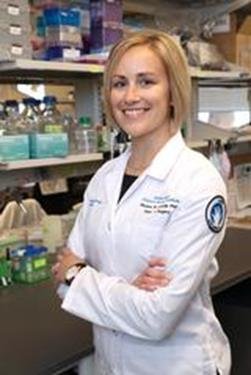 Dr. Monica Laronda
Dr. Monica LarondaWarren and Eloise Batts Scholar
Division of Pediatric Surgery and Endocrinology, Ann & Robert H Lurie Children’s Hospital
Northwestern University
Dr Monica Laronda received her undergraduate degree from Bridgewater State University in Massachusetts. She earned her PhD in Life Sciences in the laboratory of J. Larry Jameson, MD, PhD in Northwestern University’s Department of Medicine, Division of Endocrinology, while studying the role of Sox3 (sex-determining region-Y box gene 3) on spermatogonial differentiation. Dr Laronda was awarded the Burroughs Wellcome Fund Career Award at the Scientific Interface for her work in the Woodruff Lab on developing an engineered ovary using 3D printing. The BWF CASI is a transition award that continues to support he independent lab. Dr Laronda was recruited by the Stanley Manne Research Institute and the Ann & Robert H Lurie Children’s Hospital to contribute to the Fertility and Hormone Preservation of Restoration Program that bridges basic science, translational research and clinical practice. She started her appointment in the Department of Paediatrics in the Division of Endocrinology in August 2016 as a Warren and Eloise Batts Scholar.
Dr. Marcy Zenobi-Wong
 Dr. Marcy Zenobi-Wong
Dr. Marcy Zenobi-WongProfessor of Tissue Engineering and Biofabrication
Department of Health Sciences and Technology
ETH Zurich
Prof. Marcy Zenobi-Wong is an Associate Professor of Tissue Engineering and Biofabrication at ETH Zürich, Switzerland. She obtained her PhD from Stanford University and then did a post-doctoral fellowship in the Orthopaedic Research Laboratories, University of Michigan. In 2012, she moved to the Department of Health Sciences & Technology at ETH Zürich. The Zenobi-Wong research group is focused on the development of advanced biomaterials for tissue regeneration using biofabrication technologies including bioprinting, two-photon polymerization, casting and electrospinning. Dr. Zenobi-Wong is the author of over 90 peer-reviewed publications and co-inventor on four licensed patents. She is currently President of the Swiss Society for Biomaterials and Regenerative Medicine and general secretary for the International Society of Biofabrication (ISBF). She serves on the editorial board for Biofabrication and Advanced Healthcare Materials. In 2019, she was elected as Fellow to the European Alliance for Medical & Biological Engineering and Science (EAMBES).
Dr. James Yoo
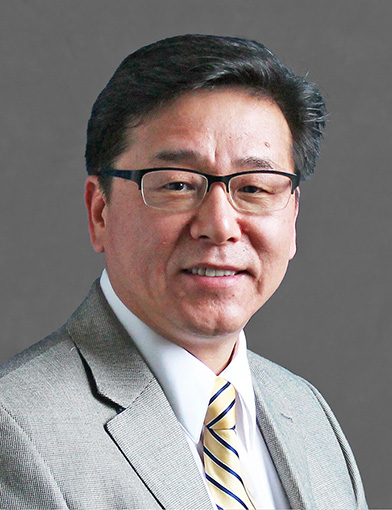 Dr. James Yoo
Dr. James YooProfessor, Wake Forest Institute for Regenerative Medicine
Dr. Yoo’s research efforts have been directed toward the clinical translation of tissue engineering technologies and cell-based therapies by developing new therapeutic modalities for the functional repair and replacement of diseased tissues and organs. His background in cell biology and medicine facilitates the transfer of numerous cell-based technologies from the bench-top to the bedside and my extensive experience in cell culture, biomaterials design, surgical techniques and animal handling has contributed to achieving functional tissues and organs for successful pre-clinical and clinical studies.
A few notable examples of successful clinical translation include the bladder, urethra, vagina, and muscle cell therapy for incontinence.
Dr. Yoo is the author of more than 150 scientific publications and have filed over 30 patent applications. He is a member of many national and international scientific societies and serve as a consultant to various scientific journals. .
Dr. Juergen Groll
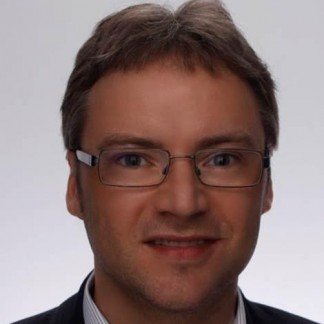
Dr. Juergen Groll
Professor, University of Wuerzburg
Prof. Jürgen Groll holds the chair for Functional Materials in Medicine and Dentistry at the University of Würzburg. His research interest comprises applied polymer chemistry for life sciences, biomimetic scaffolds, immunomodulation, nanobiotechnology, and biofabrication. Within biofabrication, he coordinates the large European integrated project HydroZONES that focuses on the printing of layered constructs for cartilage regeneration. Since 2014, he also holds the ERC consolidator grant Design2Heal that concerns the evaluation of design criteria for immunomodulatory scaffolds.
Prof. Groll received his Ph.D. from the RWTH Aachen University with summa com laude in 2005. From 2005 to 2009, he worked in industry in the field of functional coatings and biocomposite materials. In parallel, he built up a research group on polymeric biomaterials at the DWI Interactive Materials Research Institute in Aachen. He is board member of the international society for biofabrication and editorial board member of the journal Biofabrication. His work has been recognized by several awards such as the PhD thesis award of the German Society for Biomaterials in 2005, the Bayer Early Excellence in Science Award 2009, the Reimund-Stadler award of the Division of Macromolecular Chemistry of the German Chemical Society in 2010 and the Unilever Prize of the Polymer Networks Group in 2014.
Prof. Tim Woodfield
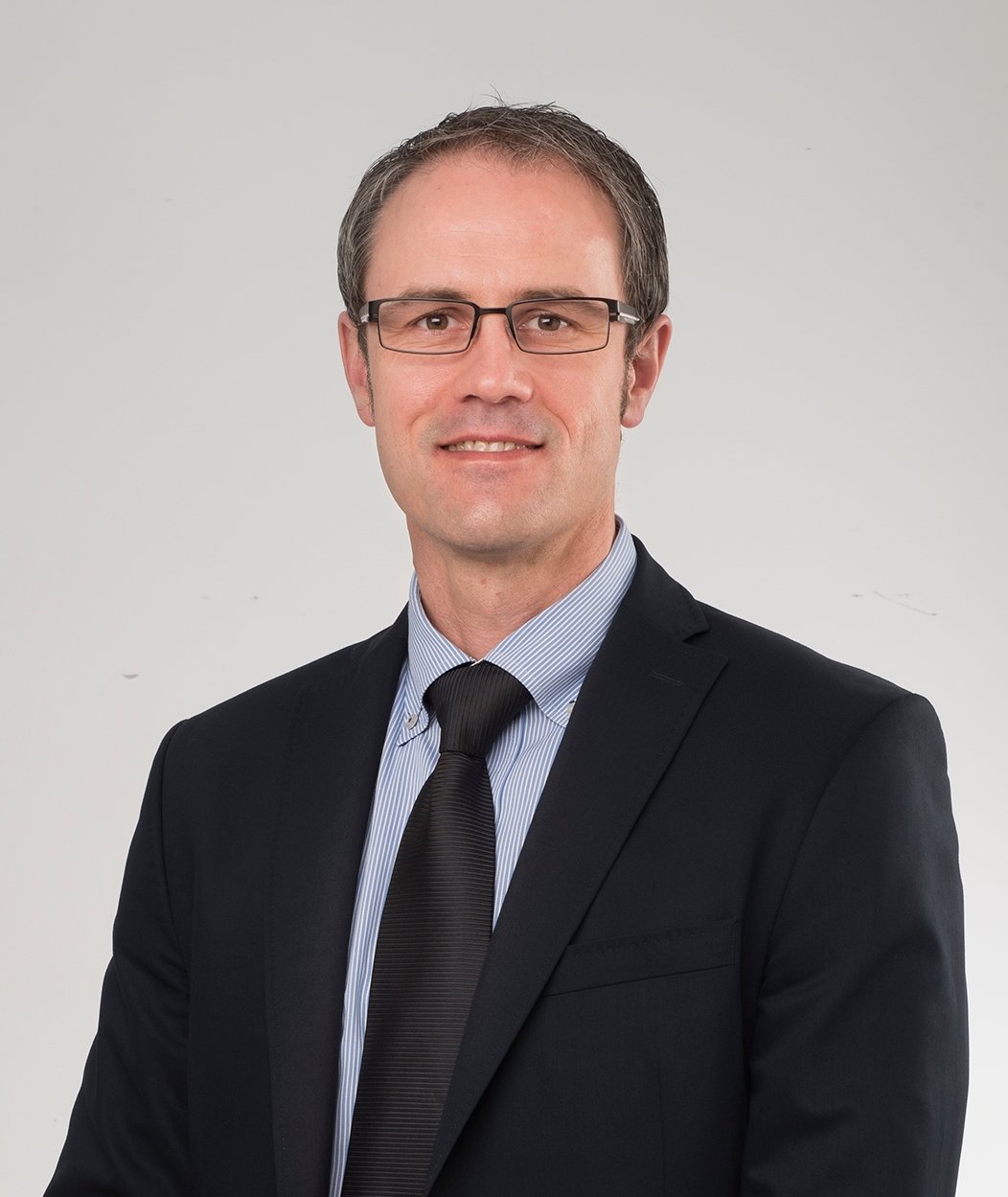
Prof. Tim Woodfield
Professor, University of Otago
Professor Woodfield leads the Christchurch Regenerative Medicine and Tissue Engineering (CReaTE) Group which is associated with the University of Otago’s Department of Orthopaedic Surgery and its Centre for Bioengineering & Nanomedicine. The Department’s location at the Christchurch hospital campus helps him maintain strong connections with the city’s medical and surgical staff, and the Centre draws upon talent across several disciplines based out of the University’s Dunedin, Christchurch, and Wellington locations in New Zealand.
His CReaTE Group is pursuing stem cell and biomaterial-based strategies for musculoskeletal tissue regeneration, and is primarily investigating their application in the clinical translation of orthopaedic medical devices & cell-based therapies.
The Group’s research technology platform includes complex 3D Biofabrication and Additive Manufacturing of biomaterial scaffolds and titanium medical devices applied to regenerative medicine of cartilage and bone, including: novel bio-ink/bio-resin development, delivery of novel biofilm inhibiters, advanced 3D tissue culture models, and high throughput screening.
Translation of laboratory discoveries into large scale manufacturing of tissues and organs - Katie Weimer
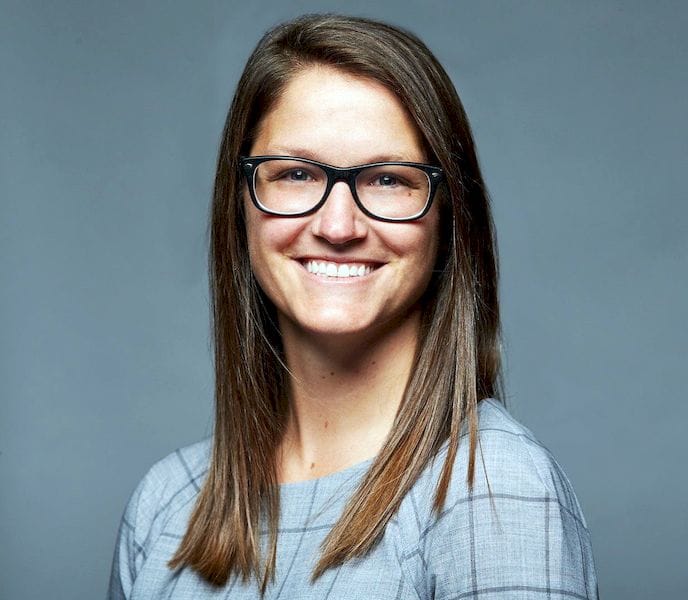
Katie Weimer, MBA
VP, Regenerative Medicine at 3D Systems Corp.
The above presentation is copyrighted information and cannot be used or shared in any way without permissions.
Translation of laboratory discoveries into large scale manufacturing of tissues and organs - Oded Shoseyov
Oded Shoseyov, PhD
Founder and CSO, Collplant
Translation of laboratory discoveries into large scale manufacturing of tissues and organs - Tal Dvir
 Tal Dvir, PhD
Tal Dvir, PhD
Director, Laboratory for Tissue Engineering and Regenerative Medicine, Tel Aviv University
Prof. Jason Burdick

Prof. Jason Burdick
Professor, Bioengineering Department, University of Pennsylvania
Jason A. Burdick, Ph.D. is the Robert D. Bent Professor of Bioengineering at the University of Pennsylvania. Dr. Burdick’s research involves the development of hydrogels through techniques such as photocrosslinking and self-assembly and their processing using approaches such as electrospinning and 3D printing. The applications of his research range from controlling stem cell differentiation through material cues to fabricating scaffolding for regenerative medicine and tissue repair. Jason currently has over 220 peer-reviewed publications and has been awarded a K22 Scholar Development and Career Transition Award through the National Institutes of Health, an Early Career Award through the Coulter Foundation, a National Science Foundation CAREER award, a Packard Fellowship in Science and Engineering, and an American Heart Association Established Investigator Award. He was recently awarded the Clemson Award through the Society for Biomaterials and the George H. Heilmeier Faculty Award for Excellence in Research. He is on the editorial boards of Tissue Engineering, Biofabrication, andJournal of Biomedical Materials Research A, and is an Associate Editor for ACS Biomaterials Science & Engineering.
ISBF & TERMIS Joint Webinar: 3-25-2021
Lorenzo Moroni – Keynote; Brice Magne, Isabel Casado Losada, and Dr. James Armstrong – Young Investigators
Organized by the TERMIS Student and Young Investigators Section of the EU and AM Chapters: International Society for Biofabrication Society Career Researchers Committee Virtual Seminar Series
ISBF & TERMIS Joint Webinar: 3-26-2021
Seung-woo Cho – Keynote
Organized by the TERMIS Student and Young Investigators Section of the EU and AM Chapters: International Society for Biofabrication Society Career Researchers Committee Virtual Seminar Series
ISBF Technology Showcase - June 1, 2021
3D Bioprinting: The Barriers to Translation - Prof. Gordon Wallace

Prof. Gordon Wallace, University of Wollongong Australia
Distinguished Professor Gordon Wallace, an esteemed innovator and educator is a scientist at the forefront of health technologies, where medical devices complement the body’s own systems to treat disease and repair injuries. An example of this is the ‘Biopen’, used by surgeons to directly print healing cells into a patient’s body during procedures, like knee surgery. With research interests in organic conductors, nanomaterials and electrochemical probe methods of analysis in intelligent polymer systems, his extensive scientific contributions has broken new ground in every aspect of electromaterials research; academic performance and outcomes, training the next generation of researchers, and facilities development. These contributions to the enhancement of Australian materials research has led to a number of high accolades for Gordon including being awarded an ARC Laureate Fellowship (2011) and the Eureka prize for leadership in Innovation and Science (2016), being named NSW Scientist of the Year (2017), and appointed an Officer in the General Division of the Order of Australia (2017). Professor Wallace is Executive Research Director of the Australian Research Council (ARC) Centre of Excellence for Electromaterials Science based at UOW; Director of UOW’s Intelligent Polymer Research Institute; and Director of the Australian National Fabrication Facility – Materials Node.
Biofabrication: From 3D Fibre Printing to 'MOrPFing' Life Size Organoid Tubes - Prof. Yan Yan Shery Huang

Prof. Yan Yan Shery Huang, University Lecturer in Bioengineering, University of Cambridge
Shery Huang’s group ‘Biointerface’, is driven by translational bioengineering research, focusing on 3D bioprinting/ biofabrication, and developing biomimetic organ-on-chips for high throughput drug testing. Living tissues are intricate ensembles of multiple cell types embedded in a complex, but well-defined extracellular matrix (ECM) of topographical and adhesive features ranging from nanometres to micrometres. Cell ladened ECMs act like units of reaction centres and information hubs. Corporation between these small units lead to a hierarchical structure (i.e. a human body) achieving homeostasis (balance). We combine nanotechnology and new material fabrication techniques to construct the defined biochemical and physical inputs of an ECM scaffold, and to recapitulate the key attributes of a ‘niche’ unit. Our research is highly multi-disciplinary in nature, crossing fields of engineering, biology, chemistry, polymer physics and computer science. We aim to translate our scientific findings into exploring a new generation of tissue engineering constructs for personalised therapy, at affordable costs; and to provide new solutions for disease monitoring, drug testing, and better patient healthcare.
Biofabrication of Microphysiological Systems for Drug Discovery and Screening
Yehiel Tal – Collplant
Katie Weimer – 3D Systems
Dr. Daniel Levner – Emulate
Dr. Ben Moatz – Tel Aviv University
Dr. Lutz Kloke – Cellbricks
Dr. Jeroen Eyckmans – Boston University
Enhancing Cross-disciplinary Biofabrication Approaches to Overcome the Challenges of Tomorrow
Tomoko Bylund – Cellink
Prof. Shoji Takeuchi – University of Tokyo
Dr. Christopher Puhl – European Space Agency
Dr. Nadav Noor – Meatech3D
Prof. Gabor Forgacs – Modern Meadow
Prof. Koichi Nakayama – Center for Regenerative Medicine Research, Saga University
Biofabrication of Microphysiological Systems for Drug Discovery and Screening
Yehiel Tal – Collplant
Katie Weimer – 3D Systems
Dr. Daniel Levner – Emulate
Dr. Ben Moatz – Tel Aviv University
Dr. Lutz Kloke – Cellbricks
Dr. Jeroen Eyckmans – Boston University
ISBF Diversity & Inclusion Symposia
Prof. Stephanie Willerth, University of Victoria, Canada
Prof. Tim Woodfield, University of Otago, NZ
Dr. Gabriella Lindberg, University of Oregon, USA
